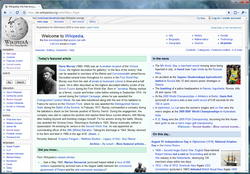SRWare Iron
 | |
 Iron rendering Wikipedia on Windows Vista | |
| Developer(s) | SRWare |
|---|---|
| Initial release | September 18, 2008[1] |
| Stable release | 3.0.197.0
/ August 9, 2009[2] |
| Preview release | 4.0.275 Beta
/ December 30, 2009[1] |
| Engine | WebKit |
| Operating system | Microsoft Windows, Linux, MacOS X |
| Size | 10.3MB (Iron 3.0.197.0 for Windows) |
| Type | Web browser |
| License | BSD (source code and Chromium executable) |
| Website | Official website Template:En icon |
SRWare Iron, or simply Iron, is a free and open-source web browser implementation of Chromium[2] which primarily aims to eliminate usage tracking and other privacy compromising functionality that the Google Chrome browser includes.
Iron includes other notable unique features. In contrast to Chrome, it implements the latest version of the WebKit rendering engine, and includes built-in ad blocking.[1] A common speculation is that Chrome's future ad blocking feature will not work properly because it might exclude Google-affliated ads.[3]
Development history
Iron was first released on September 18, 2008, 16 days after Chrome's initial release. According to Iron's developers, Chromium's source code was extensively modified in order to remove any tracking-related functionality.[4] On January 22, 2009 a developer preview was released.[5]
More recent versions of Iron have since been released, which have gained the features of the underlying Chromium codebase, including theme support, a user agent switcher, an extension system, and improved support for Linux.[1]
On January 7, 2010 an initial version for Mac OS X was released.[6]
Differences from Chrome
The following Google Chrome features are removed from Iron[4]:
- RLZ identifier, an encoded string sent together with all queries to Google [7] or once every 24 hours when the browser is being used[citation needed].
- Does not access Google search on startup [citation needed] for users with Google as default search [8], thus decreasing performance[citation needed].
- A unique ID ("clientID") for identifying the user in logs.[9]
- A timestamp of when the browser was installed.[9]
- Google-hosted error pages when a server isn't found.[citation needed]
- Google Updater automatic installation.[4]
- DNS pre-fetching.
- Automatic address bar search suggestions.
- Bug tracking system, sends information about crashes or errors.
See also
References
- ^ a b c d Iron news page Cite error: The named reference "news" was defined multiple times with different content (see the help page).
- ^ a b Iron stable news and download
- ^ "Google Chrome extensions: Not yet, but later". Retrieved 2009-02-27.
- ^ a b c Iron FAQ page
- ^ Iron beta news and download
- ^ Iron for MacOS X
- ^ "Google Chrome, Chromium, and Google".
{{cite web}}:|access-date=requires|url=(help); Missing or empty|url=(help); Text "http://blog.chromium.org/2008/10/google-chrome-chromium-and-google.html" ignored (help) See Which Google Domain - ^ "Google Chrome, Chromium, and Google".
{{cite web}}:|access-date=requires|url=(help); Missing or empty|url=(help); Text "http://blog.chromium.org/2008/10/google-chrome-chromium-and-google.html" ignored (help) See Which Google Domain - ^ a b "Privacy, unique IDs, and RLZ - Google Chrome".
